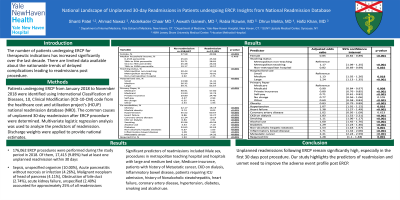Sunday Poster Session
Category: Interventional Endoscopy
P1051 - National Landscape of Unplanned 30-Day Readmissions in Patients Undergoing ERCP: Insights from National Readmission Database
Sunday, October 27, 2024
3:30 PM - 7:00 PM ET
Location: Exhibit Hall E

Has Audio
- SP
Shanti Patel, MD
Yale New Haven Hospital
New Haven, CT
Presenting Author(s)
Shanti Patel, MD1, Abdelkader Chaar, MD2, Ahmad Nawaz, MD2, Rabia Rizwan, MD3, Ganesh Aswath, MD2, Dhruv Mehta, MD4, Hafiz Muzaffar Akbar Khan, MD2
1Yale New Haven Hospital, New Haven, CT; 2SUNY Upstate Medical University, Syracuse, NY; 3Yale New Haven Health, New Haven, CT; 4Hackensack Meridian Health, Edison, NJ
Introduction: The number of patients undergoing ERCP for therapeutic indications has increased significantly over the last decade. There are limited data available about the nationwide trends of delayed complications leading to readmissions post procedure.
Methods: Patients undergoing ERCP from January 2018 to November 2018 were identified using International Classification of Diseases, 10, Clinical Modification (ICD-10-CM) code from the healthcare cost and utilization project’s (HCUP) national readmission database (NRD). The common causes of unplanned 30-day readmission after ERCP procedure were determined. Multivariate logistic regression analysis was used to analyze the predictors of readmission. Discharge weights were applied to provide national estimates.
Results: 176,062 ERCP procedures were performed during the study period in 2018. Of them, 17,415 (9.89%) had at least one unplanned readmission within 30 days. Sepsis, unspecified organism (10.00%), Acute pancreatitis without necrosis or infection (4.26%), Malignant neoplasm of head of pancreas (4.11%), Obstruction of bile duct (2.74%), acute kidney failure, unspecified (2.40%) accounted for approximately 25% of all readmissions. Significant predictors of readmissions included Male sex, procedures in metropolitan teaching hospital and hospitals with large and medium bed size, Medicare insurance, patients with history of Metastatic cancer, CKD on dialysis, Inflammatory bowel disease, patients requiring ICU admission, history of Nonalcoholic steatohepatitis, heart failure, coronary artery disease, hypertension, diabetes, smoking and alcohol use.
Discussion: Unplanned readmissions following ERCP remain significantly high, especially in the first 30 days post procedure. Our study highlights the predictors of readmission and unmet need to improve the adverse event profile post ERCP.
Disclosures:
Shanti Patel, MD1, Abdelkader Chaar, MD2, Ahmad Nawaz, MD2, Rabia Rizwan, MD3, Ganesh Aswath, MD2, Dhruv Mehta, MD4, Hafiz Muzaffar Akbar Khan, MD2. P1051 - National Landscape of Unplanned 30-Day Readmissions in Patients Undergoing ERCP: Insights from National Readmission Database, ACG 2024 Annual Scientific Meeting Abstracts. Philadelphia, PA: American College of Gastroenterology.
1Yale New Haven Hospital, New Haven, CT; 2SUNY Upstate Medical University, Syracuse, NY; 3Yale New Haven Health, New Haven, CT; 4Hackensack Meridian Health, Edison, NJ
Introduction: The number of patients undergoing ERCP for therapeutic indications has increased significantly over the last decade. There are limited data available about the nationwide trends of delayed complications leading to readmissions post procedure.
Methods: Patients undergoing ERCP from January 2018 to November 2018 were identified using International Classification of Diseases, 10, Clinical Modification (ICD-10-CM) code from the healthcare cost and utilization project’s (HCUP) national readmission database (NRD). The common causes of unplanned 30-day readmission after ERCP procedure were determined. Multivariate logistic regression analysis was used to analyze the predictors of readmission. Discharge weights were applied to provide national estimates.
Results: 176,062 ERCP procedures were performed during the study period in 2018. Of them, 17,415 (9.89%) had at least one unplanned readmission within 30 days. Sepsis, unspecified organism (10.00%), Acute pancreatitis without necrosis or infection (4.26%), Malignant neoplasm of head of pancreas (4.11%), Obstruction of bile duct (2.74%), acute kidney failure, unspecified (2.40%) accounted for approximately 25% of all readmissions. Significant predictors of readmissions included Male sex, procedures in metropolitan teaching hospital and hospitals with large and medium bed size, Medicare insurance, patients with history of Metastatic cancer, CKD on dialysis, Inflammatory bowel disease, patients requiring ICU admission, history of Nonalcoholic steatohepatitis, heart failure, coronary artery disease, hypertension, diabetes, smoking and alcohol use.
Discussion: Unplanned readmissions following ERCP remain significantly high, especially in the first 30 days post procedure. Our study highlights the predictors of readmission and unmet need to improve the adverse event profile post ERCP.
Disclosures:
Shanti Patel indicated no relevant financial relationships.
Abdelkader Chaar indicated no relevant financial relationships.
Ahmad Nawaz indicated no relevant financial relationships.
Rabia Rizwan indicated no relevant financial relationships.
Ganesh Aswath indicated no relevant financial relationships.
Dhruv Mehta indicated no relevant financial relationships.
Hafiz Muzaffar Akbar Khan indicated no relevant financial relationships.
Shanti Patel, MD1, Abdelkader Chaar, MD2, Ahmad Nawaz, MD2, Rabia Rizwan, MD3, Ganesh Aswath, MD2, Dhruv Mehta, MD4, Hafiz Muzaffar Akbar Khan, MD2. P1051 - National Landscape of Unplanned 30-Day Readmissions in Patients Undergoing ERCP: Insights from National Readmission Database, ACG 2024 Annual Scientific Meeting Abstracts. Philadelphia, PA: American College of Gastroenterology.
